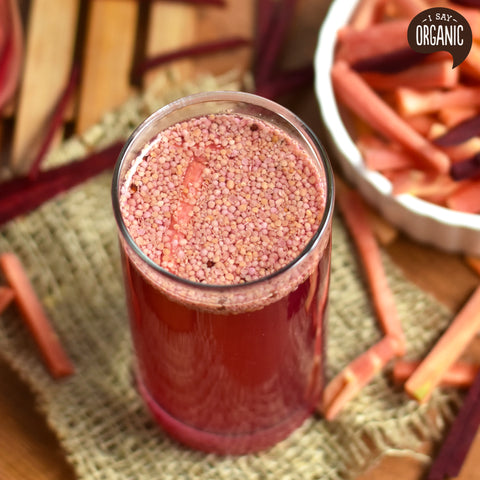Superfoods That Help Your Gut Be Healthy!
Superfood isn't a term that has been around forever. This word is attributive to an enhanced nutrition quality of a specific food in terms of its nutrition and health benefits. As a matter of fact, the first food product that was described as a ‘superfood’ was bananas. (1) This adjective was coined by the United Fruit Company in the early phase of the twentieth century but the craze for this term soon fizzled it.
The word ‘superfoods’ has recently made a comeback in a more profound and established way. They denote the advantage of incorporating that particular food into your dietary regime to experience outstanding health benefits.
The importance of maintaining good gut health cannot be underestimated. Studies have shown that there is a connection between good gut health and an excellent immune system. (2) This translates wonderfully into good overall health.
Your intestinal tract or gut is intrinsic to your body’s well-being. Every meal you eat is digested because of your gut. Your health and immunity are kept at optimum levels because of your…you guessed it. Did your gut tell you the answer?
You’re also feeding thousands of bacteria strains in your gut and other organs with every meal. These bacteria, which vary according to genetics, environment, diet, age and more, help break down food into energy. New research has shown that these microbes affect our weight, health and even mood swings. Our intestinal flora changes how we absorb food, stay healthy and recover from injuries or sickness.
Eating a plant-based diet rich in superfoods is not just in line with overall health recommendations; it’s also great for your brain health, your immunity and your stomach; by way of your gut. As adults who choose organic food, what foods help us help our gut? We decided to take a deeper look.
For good intestinal health, you need prebiotic and probiotic food
Our gut or the lining of our stomach consists of a number of little organisms that constitute the microbiome. (3) If you wish to keep your gut healthy, then you have to make an effort towards the upkeep of the healthy bacteria that lines your gut. There are two ways to do so:
1. Consumption of prebiotics
Prebiotics are special plant fibres that facilitate the growth of good and healthy bacteria inside your gut.
2. Consumption of probiotics
Probiotics refer to living organisms that are essentially a healthy strain of good bacteria that get directly added to your gut to improve its overall health. (4) .
Fibrous or generally prebiotic foods
High-fibre foods like veggies, fruits, lentils, millets/grains, dry fruits and seeds give the bacteria in your gut something to feast on and thus keep them humming and healthy. Focusing on these foods means you keep away refined grains, processed foods, trans fats, artificial sweeteners and more. Onions, garlic, beets, cabbage, bananas and oats are especially beneficial for gut bacteria.


Fermented or generally probiotic foods
South-east Asian countries like Korea, Vietnam and Japan are big on fermentation – small surprise that their populations are some of the healthiest in the world. Fermented foods like kimchi owe their distinctive tang to lactic acid-producing bacteria that help support a healthy digestive system. Closer home, foods like pickles, dhokla, kanji, idli and dosa also pack quite a punch.


How to include gut-friendly foods during your day
1. Include more nut-milk or soymilk based yoghurt in your diet, especially at breakfast. Yoghurt’s probiotics are uniquely advantageous in reducing bloating, helping bowel regularity, and optimising immune health. Blend into a smoothie or eat with cereal.
2. Eat fermented foods during at least one meal a day. Include a serving of kimchi, miso soup, dhokla, dosa or idlis during a meal. Kimchi, the Korean cabbage specialty, is easy to make at home and is a great fibrous addition to your diet as well.
3. Try Apple Cider Vinegar. It stinks a bit but comes with many benefits. Have a shot in the morning or after a workout. Or make kanji, and enjoy its tangy fermented benefits.
4. Choose dark chocolate for dessert. It will make you happy with serotonin, and the prebiotics AND probiotics in chocolate will make your gut happy.
5. Choose salads and fruits as much as possible for lunches or snacks.
FAQs
Q1: Can you improve your gut health by making changes in your eating habits?
By making well-informed decisions in terms of your food choices can go a long way in making your gut healthy. By consuming a balanced diet, you can supply the necessary fibre to the good bacteria in your gut to proliferate at an ideal speed and take care of your digestive health.
Q2: What are the signs of an ill-functioning gut?
If your gut isn't working properly, then the effects of the same can be experienced in a number of different ways. You might develop low immunity, irritable bowel syndrome (IBS), abnormal weight gain, mood swings etc. (5) A healthy gut is imperative for leading a wholesome and healthy diet life.
Q3: What are the top three foods that can help you achieve a healthy gut?
The best food products that you can add to your diet for good gut health are fermented foods, fruits and nuts. Fermented foods like yogurt, kombucha etc are infused with good bacteria for your digestive health whereas fruits and nuts have a generous amount of plant fibre that is vital for taking care of your gut health.






